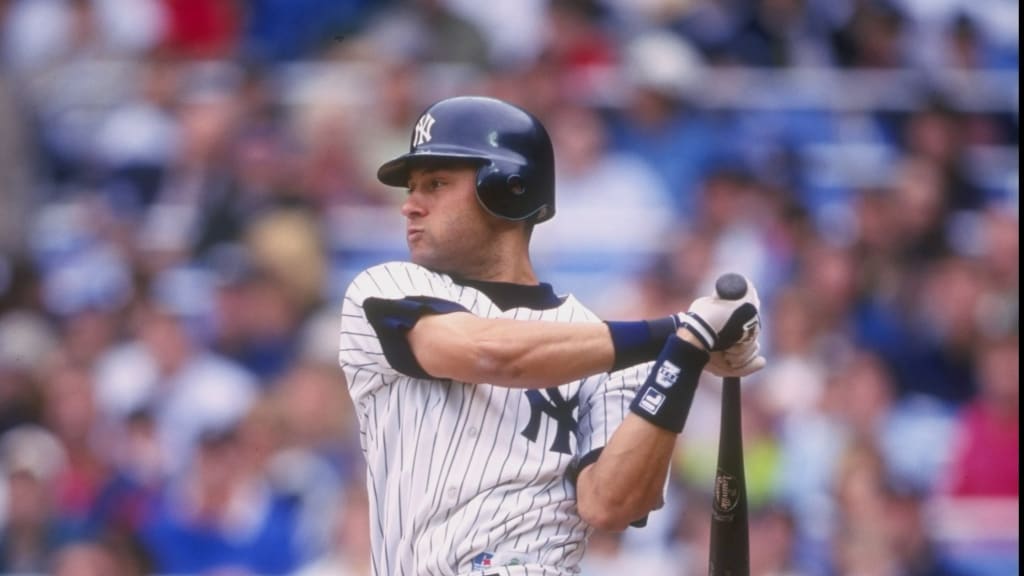
As ESPN releases “The Captain,” a seven-part documentary about the career of Derek Jeter, we are revisiting some of the memories that defined the Hall of Famer’s legendary career. Episodes 3 and 4 of “The Captain” premiere tonight on ESPN and ESPN+ at 9 ET. All episodes are subsequently available on ESPN+. Note: A version of this story was first published in 2014.
The lanky, homesick teenager arrived in Florida during the summer of 1992, having just swapped his Kalamazoo Central High School uniform for a first set of Yankees pinstripes. An 18-year-old Derek Jeter began his search for anything that reminded him of the life he had left behind in Michigan.
It didn't take long: Jeter picked up a black Louisville Slugger P72, thinking the weight seemed comparable to the aluminum bats he was familiar with. Jeter never put it down, and so from his first professional plate appearance to his last, each and every one came with Jeter swinging that model.
"It just felt comfortable," Jeter said in 2014. "I think at one time in the offseason, I may have swung a different one in a cage, but I have never had an at-bat with a different model bat."
That choice of lumber paid dividends. Jeter's model was a 34-inch, 32-ounce bat crafted out of northern white ash, owning a medium-sized barrel, thin handle and balanced weight distribution to help get the bat head through the strike zone for both average and power.
A 2014 examination of the company's records showed that Jeter ordered a 33-1/2 inch, 31-ounce version until 1997, when he switched to the slightly longer and heavier model that he carried to the plate for his final big league at-bat.
"I think a lot of it just speaks to his character and the person he is," said Rick Redman, VP of corporate communication at Hillerich & Bradsby. "He's one of those guys who's just extremely loyal. If something is working for him, he thinks, 'Why change it?'"
From the Gulf Coast League to his final tally of 3,465 big league hits (plus an even 200 more in the postseason), Jeter said he was constantly fine-tuning his craft, seeing room for improvement when others might have been satisfied to stand pat.
"It takes time to get used to a wooden bat, period,” Jeter said. “I never was tempted to change."
Other players have found and stayed with one bat model, but many like to experiment. For example, former big leaguer Mark Teixeira guessed that he mixed and matched with 10 different brands, swapping out his choices depending on his opinion of the most recent shipment.
"Each company from year to year, the quality of wood varies," Teixeira said. "And so you'll have a run of a couple years where the wood is really good with one company, and then you get a batch of wood that's no good, and so you have to switch."
During Jeter’s final campaign, Teixeira said he was experimenting with three different brands -- Marucci, Chandler and SSX. It did not surprise him that Jeter locked into one bat for his entire career.
"I think someone like Derek does get the best wood from Louisville Slugger," Teixeira said. "You'd better believe they're going to take care of a guy like Derek. He's consistently getting some of the best wood in the game. There's only so many quality pieces of wood. Derek is probably first on their list."
In a telephone conversation from Slugger HQ, Redman laughed when Teixeira's comment was relayed.
"We make every effort possible to make sure that all of our contract players are getting the very best wood that's possible," Redman said. "It's always funny to hear guys say that. That's the kind of thing we've heard for 50, 60, 70 years. Some things never change."
Through Yankees equipment manager Rob Cucuzza, Jeter typically placed orders for one or two dozen bats at a time, depending on the time of the season. One plus: Jeter could tear open the cardboard box and get to work without thinking much about the contents.
"That's one of the great things about Derek: We never had to ask what he wanted," Redman said.
Jeter was not as fanatical about his bats as, say, Ichiro Suzuki, who carried his best choices in a mini-trunk that looked like a guitar case and doubled as a dehumidifier. But since Jeter defines himself as "a creature of habit," that extends to some of his other equipment as well.
"See these, man?" Jeter said, yanking his uniform pants above his knee, revealing a well-worn white Velcro strap that hugged the top of his sock. "I've had the same pretty much everything. These things, I've had since the first game.
"We used to have a rule in the Minor Leagues that you had to show four inches of blue on your stirrups, so these things kept your pants up. If you see any old Minor League pictures, you'll always see guys; their pants had to be like this, showing four inches of blue."
In his final games, Jeter wore his pant legs covering most of the sock, but the straps remained hidden underneath -- a reminder of the long journey to the Majors. In fact, several pieces of the toolkit were constants, including his fielding glove, a black Rawlings model that bore his initials and number: DJPRO2.
"I switched models of gloves after my first full year. I struggled," Jeter said. "I made a lot of errors in [Class A] Greensboro and my glove was a little bigger, so I switched to a smaller glove. I've been using that since '93, Instructional League, so the '94 season."
Obviously, the P72 did not start with Jeter. The bat company first crafted it in 1954 for Les Pinkham, a Minor League player from Elizabethtown, Ky., who never made it to the big leagues. Pinkham was the 72nd player with a last name that begins with "P" to order a bat, thus the model number.
According to Louisville Slugger, Cal Ripken Jr. often used a P72 during his Hall of Fame career with the Orioles, and fellow Hall of Famers Robin Yount and Ivan Rodriguez used it as well. As of Jeter’s final season, it was still in service with two other big leaguers: Lyle Overbay and Kelly Johnson. Louisville Slugger retired the P72 in 2015, though you can still order one to Jeter’s exact specifications under the model number DJ2.
"It's been a very popular bat, but nobody will ever touch what Derek Jeter did with it, that's for sure," Redman said.
